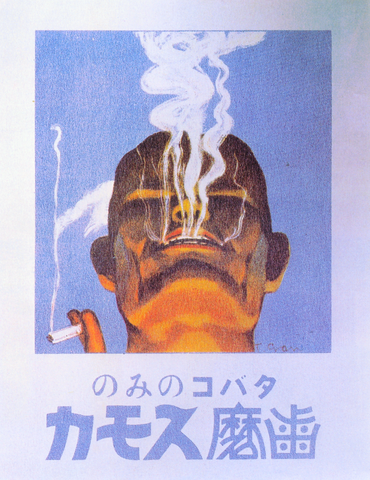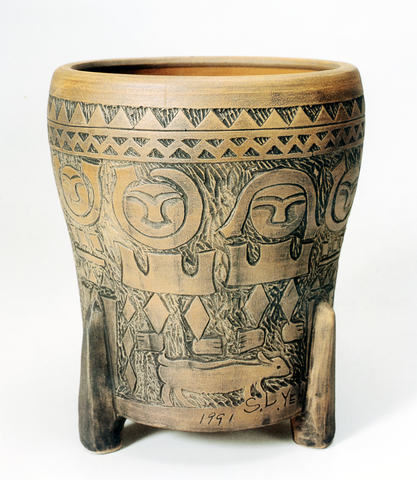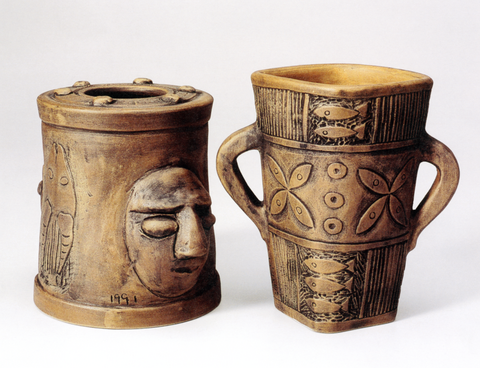Had Yan Shui-long (
Apart from being an outstanding oil painter, Yan devoted his life to handicrafts from his youth, trying several times -- though without success -- to set up his own handicraft school. He also wrote extensively on the subject in his later years.
Pioneer of Taiwanese Handicraft: special exhibition of Yan Shui-long's 100th anniversary, (

PHOTO COURTESY OF TAIPEI CRAFT DESIGN CENTER
To shed light on the life of a dedicated master, the exhibition also includes a reconstruction of Yan's studio, his collection of exotic handicrafts from other countries and some well-designed personal items like his glasses cases. Together, these create a rounded picture of an artist who lived out his art in his life.
Well-known as the "Father of Taiwanese handicraft," Yan juggled teaching, painting and making handicrafts. In preparation for a retrospective in 1997, which was meant to celebrate his 95th birthday, Yan painted eight hours a day in the hope of presenting an impeccable selection of works. He was tired out and slipped in his bathroom, sustaining a bone fracture. He soon died from complications resulting from an operation on the injury.
Throughout his life, Yan advocated the merits of handicrafts. "Art is not just a painting on the wall," Yan once said. Handicrafts not only help improve living standards in a developing country but foster people's appreciation of beauty, Yan said. They can give people a lift in a country that values wealth and longevity, because their influence on people are more far-reaching than fine art.

At a time when most artists in Taiwan would not demean themselves to make product designs or advertisements, Yan created many of these kinds of works. His series of 12 advertisements for Japan's Smoca tooth powder is the best part of the exhibition.
"Since freshening up after getting up in the morning is your style, how can you not use Smoca after smoking?" the advertisement asks in Japanese with a simple yet inviting picture of a bathroom door left ajar.
Yan's package designs for Taichung's Tai Yang Tang (

Rural life and Aboriginal culture inspired him most. Yan expressed his admiration for Aboriginal esthetics in his clay works. The stock imageries of snakes, fish and human figures are adjusted to depict the true life style of Aboriginal people.
Mural mosaics are another part of Yan's celebrated works. Apart from Rural Life mosaic in Taipei's Chian-tan Park and Sports in Taichung Stadium, the exhibition includes large pictures of many other mosaics which are located in less-visited places across the country.
"Pioneer of Taiwanese Handicraft," an exhibition celebrating Yan Shui-long's 100th anniversary will run until Oct. 26 at the National Taiwan Craft Research Institute's Taipei Craft Design Center, 9F, 20 Nanhai Rd, Taipei (

William Liu (劉家君) moved to Kaohsiung from Nantou to live with his boyfriend Reg Hong (洪嘉佑). “In Nantou, people do not support gay rights at all and never even talk about it. Living here made me optimistic and made me realize how much I can express myself,” Liu tells the Taipei Times. Hong and his friend Cony Hsieh (謝昀希) are both active in several LGBT groups and organizations in Kaohsiung. They were among the people behind the city’s 16th Pride event in November last year, which gathered over 35,000 people. Along with others, they clearly see Kaohsiung as the nexus of LGBT rights.

Dissident artist Ai Weiwei’s (艾未未) famous return to the People’s Republic of China (PRC) has been overshadowed by the astonishing news of the latest arrests of senior military figures for “corruption,” but it is an interesting piece of news in its own right, though more for what Ai does not understand than for what he does. Ai simply lacks the reflective understanding that the loneliness and isolation he imagines are “European” are simply the joys of life as an expat. That goes both ways: “I love Taiwan!” say many still wet-behind-the-ears expats here, not realizing what they love is being an

In the American west, “it is said, water flows upwards towards money,” wrote Marc Reisner in one of the most compelling books on public policy ever written, Cadillac Desert. As Americans failed to overcome the West’s water scarcity with hard work and private capital, the Federal government came to the rescue. As Reisner describes: “the American West quietly became the first and most durable example of the modern welfare state.” In Taiwan, the money toward which water flows upwards is the high tech industry, particularly the chip powerhouse Taiwan Semiconductor Manufacturing Co (TSMC, 台積電). Typically articles on TSMC’s water demand

Every now and then, even hardcore hikers like to sleep in, leave the heavy gear at home and just enjoy a relaxed half-day stroll in the mountains: no cold, no steep uphills, no pressure to walk a certain distance in a day. In the winter, the mild climate and lower elevations of the forests in Taiwan’s far south offer a number of easy escapes like this. A prime example is the river above Mudan Reservoir (牡丹水庫): with shallow water, gentle current, abundant wildlife and a complete lack of tourists, this walk is accessible to nearly everyone but still feels quite remote.